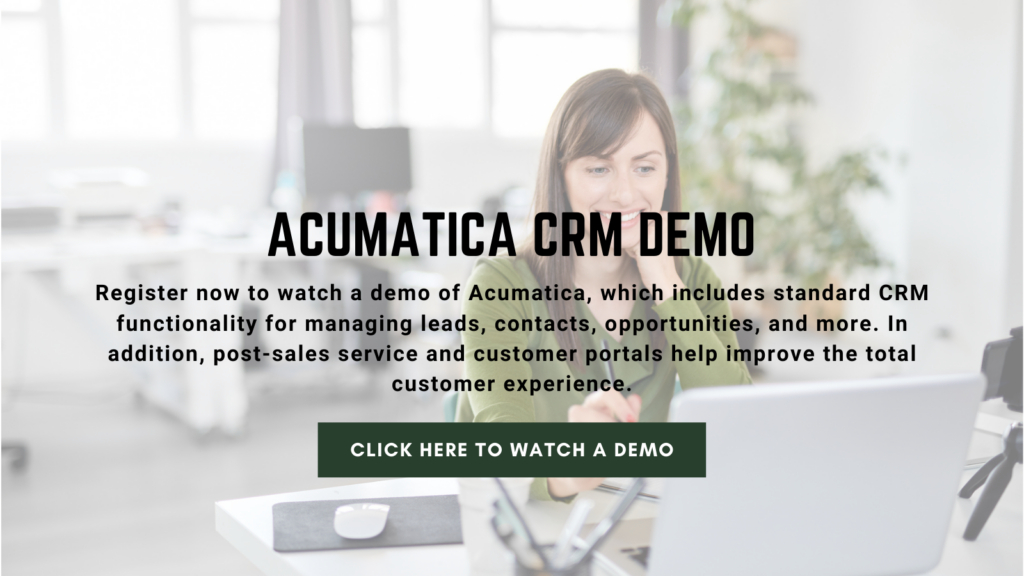Enterprise Resource Planning (ERP) and Customer Relationship Management (CRM) are often separate but related software solutions used to automate essential businesses processes. Companies get the advantage of centralized financial and operational systems. CRM is the central repository of all your customer data. CRM is all about getting more and better customer interaction with your business.
As ERP and CRM evolve, they are starting to develop overlapping functionality. Many ERP packages, like Acumatica, offer CRM functions. Some CRM solution contain sales management and sales operations functions comparable to what is available on ERP. There are benefits to integrating ERP and CRM, as the two types of software come together to help you manage customer relationships across the complete order cycle.
Differences Between ERP and CRM
ERP and CRM are directly related to the “front office” and the “back office.” CRM is the “front office” for customer data, essential for the sales and customer service departments. ERP is the “back office” system primarily used by the finance and operations departments for financial data.
ERP systems can include an optional, integral CRM module, but CRM software generally does not offer too much in the way of ERP. For instance, Salesforce.com does not handle transactional data. Rather, it is a stand-alone CRM. Order history and invoices would be accessed through integration with an ERP system.
CRM software manages and organizes the ways that your customers interact with your business. Prior to the advent of established CRM solutions, sales force automation (SFA) tools concentrated on the needs of sales departments. Companies needed all of their sales information in one place, which led to the development of the unified system called Customer Relationship Management. Sales departments needed to track sales performance management and commissions. These are now standard in CRM systems, but in the past, because of the complexity, dedicated sales and marketing software packages were sold separately. This is still true in certain cases today.
ERP And CRM Benefits Are Many
ERP empowers your company with a single point of operation for all your procurement and operational data and transactions. Most modern ERP solutions also now include accounting and finance functionality, along with optional modules for warehouse management, distribution, field service and more. Extensive reporting is usually available as well. The system is centralized, with role-based permissions designed by leadership. This allows access only to those approved by management. The system is designed with layers of security to protect sensitive data. Being able to audit data, along with whom and where data was accessed, reduces financial risk.
Employees are able to research, analyze and capture what they without having to bother IT or operations. Businesses as a whole become agile and can now make decisions that increase efficiency and profits.
Another great benefit of incorporating an ERP system is a much faster monthly or quarterly financial close. Companies are moving away from using spreadsheets and basic accounting software such as Quickbooks. The extensive and time-consuming manual work is cumbersome and open to human error. A centralized ERP system automates communications, data entry, departmental reports and other tasks that reduce close times to as little as a few days.
CRM keeps all customer data and interactions in one central place. Customer history is available for sales and marketing teams, as well as for analytics processes. CRM gives you a clear overview to assess in which direction the business can move. Information on sales team performance, order history, high-value customers and real-time status allow for more informed decisions and communications with relevant departments, all without the e-mail trails, notes and multiple spreadsheets notorious for holding everything up.
Learn more in our article Top Benefits of CRM For Your Business.
Integrating ERP and CRM
Businesses are finding value in integrating ERP and CRM. After all, the orders processed through ERP are from customers managed in CRM. It’s optimal to have just one, integrated data set for all customers and their transactions. By linking the two solutions, customer data will be up-to-date in both systems. And, follow-on marketing campaigns can be based on accurate recent transactions.
The challenge has been making ERP/CRM integration work. Legacy ERP and CRM are not suited to integration, due to the need to manage interfaces between the solutions and related maintenance. Cloud ERP and CRM changes this equation. New, cloud-native ERP and CRM applications are relatively easy to integrate using APIs.
With solutions like Acumatica Cloud ERP, a ready-to-integrate CRM module is available more or less on demand. Acumatica’s CRM solution is not a separate application but an essential and built-in component of Acumatica’s comprehensive cloud ERP solution. Together, the integrated CRM and ERP solution helps businesses easily and effectively manage leads, contacts, opportunities, and customer accounts with source of awareness through the sales cycle.
To learn more about the potential to integrate ERP and CRM, contact us today! Or watch our Acumatica CRM demo.


